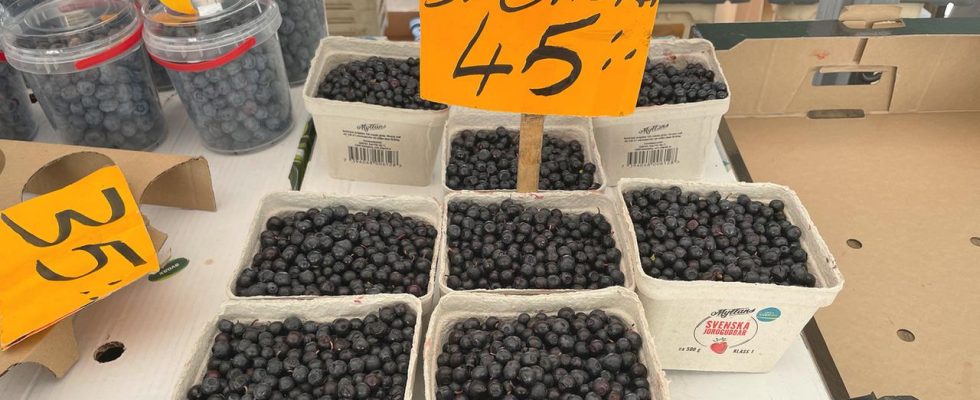A woman picks four tons of berries without earning a dime. A minister speaks of “slave-like conditions”: Swedish journalists have researched how berry pickers are being exploited.
Wild berries are part of the Swedish summer and are popular. Pure, in pancakes or in a bowl. It’s no secret in Sweden that they are laboriously picked by seasonal workers from Thailand. But what a team of investigative journalists from the Swedish newspaper “Dagens Nyheter” (DN) has found about the working conditions has sparked a debate that is tarnishing the country’s self-image.
Swedes are often proud of the protection of workers’ rights in their country. 65 percent of the employees are organized in unions (in Germany it is about 16 percent), everyone has the right to four weeks of vacation at a time. But seasonal workers can’t even dream of something like that, the DN reporters found.
Many berry pickers received less than 50 euros for three months of work. A woman picked four tons of berries without earning a penny. “What’s going on in our berry forests is a modern form of slavery,” says Deputy Labor Secretary Paulina Brandberg.
In Sweden, the right of public access applies to berry picking – so the harvest workers have to hope that nobody in the forest will forestall them beforehand.
system of exploitation
The DN reporting team traveled to Thailand and interviewed 77 people who had been picking berries in Sweden. Previously, only isolated cases were reported. But the research shows a system of exploitation. People were lured with big promises: “The people who come are often rice farmers, poor people, even by Thai standards. Many want to use the money to pay for their children’s education,” says reporter Marianne Björklund. Around 3,000 euros is also what Swedish law calls the guaranteed salary for seasonal workers. Only: Not a single one of the 77 workers got as much.
In the northern Thai province of Nong Khai, for example, DN reporters met Phatsorn Nantachai. She had read on social media that if you pick berries in Sweden, you return to Thailand with just under 3,000 euros.
Phatsorn Nantachai flew from Bangkok to Stockholm, where a Swedish company organized her stay, she says. A normal working day started at half past four in the morning. She recalls, she tells reporters, that she was always happy to leave the cramped quarters. There were few toilets and often neither heating nor hot water.
Anyone can pick
Picking is difficult. Everyman’s right applies in Swedish forests. That means anyone can pick almost anywhere and keep the berries – even for commercial purposes. The Thai workers are driven into the forest in buses. There they have to look for berries and hope that the areas have not already been grazed by others.
The berries are then sold on the market or in supermarkets. Phatsorn says she picked berries for at least 12 hours for 79 consecutive days. She managed to pick more than three tons of berries.
A few days before she left for home, she received her wages: 300 Swedish kronor – a little less than 30 euros. “I worked hard, I walked several miles every day with the berries on my back and I didn’t get anything in return,” she says.
How can such a thing be? The reason is a network of companies that organize the work of the Thais in Sweden. Recruiters from Thailand work with Swedish companies. “The companies often change their names. There is a fairly close connection between the Swedish and Thai companies,” says DN journalist Alexander Mahmoud.
Two contracts
There are two contracts for each picker. In one contract, the salary is around 3,000 euros. But the other contract lists deductions for housing, transport and food. In addition, the pickers would have to pick certain quantities. “In many Thai companies you have to pick about four tons of berries to get to zero and then you still have costs because the workers have to buy their own picking tools,” says Mahmoud.
The reporters met 36 berry pickers in a village, all working for the same Thai recruitment company. Everyone said they received 300 Swedish kroner as salary before going home.
They banded together and called themselves “300 Crown Warriors”. “People were totally frustrated and angry. They had worked from sunrise to sunset. They had 600 to 700 working hours,” says Mahmoud.
Government wants to change law
The affected Swedish companies told the journalists from “Dagens Nyheter” that they were not to blame for the poor wage conditions. They referred to the Thai companies, which are formal employers.
The government in Sweden wants to change the law after the research. “There must be no areas in Sweden where human trafficking or slavery can go unpunished,” says Paulina Brandberg. “We need to make sure the authorities have the tools and resources they need to take decisive action, no matter where in the country the problem occurs.”
But changing the law takes time – and according to the Swedish media, there are already around 6,500 pickers from Thailand in the Swedish forests.

